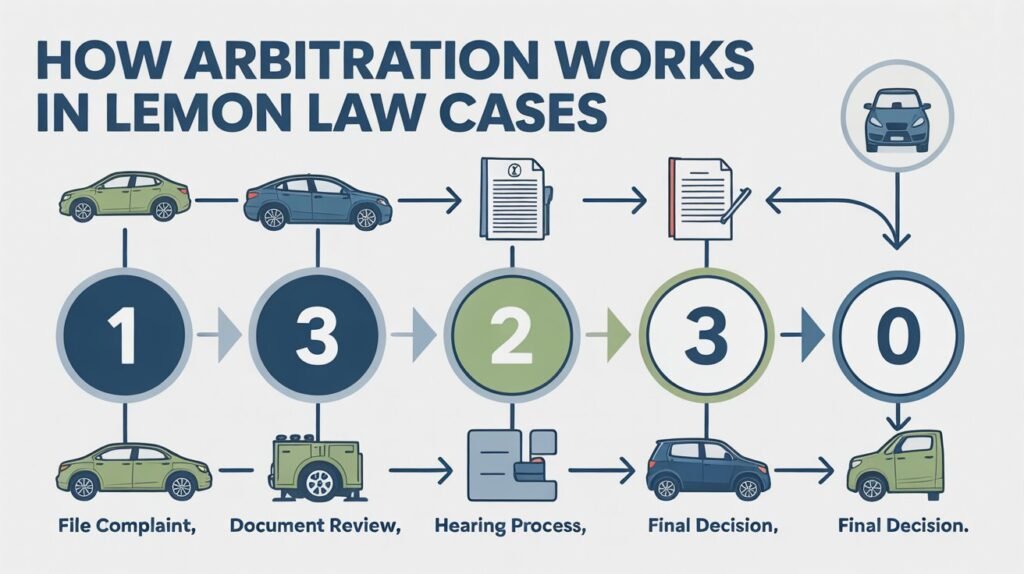When you purchase a car and discover ongoing, unfixable issues plague it, what are your options? Many consumers turn to lemon laws, which exist to protect buyers of defective vehicles, often referred to as “lemons.” One of the most practical remedies is arbitration—a process in which a neutral third party resolves the dispute outside of court. Arbitration is designed to be more streamlined than litigation, making it an important alternative for those seeking faster and less expensive results. For those in the Midwest, an Oklahoma lemon law attorney can provide guidance tailored to your state’s policies and ensure you pursue the right path for your case.
Unlike court trials, which can drag on and require significant legal fees, arbitration cases are typically resolved in a matter of weeks or months. Both consumers and manufacturers benefit from the informal setting and relatively simple procedures. The process is overseen by an arbitrator, who listens to each side, reviews evidence, and issues a binding decision.
Arbitration for lemon law claims is built around a straightforward sequence of steps:
- Filing a Claim: The process begins with the consumer submitting a detailed request outlining the car’s defects and all attempted repairs.
- Review and Scheduling: The arbitration body assesses the validity of the claim and schedules a hearing date.
- Hearing: Both the consumer and manufacturer present their arguments, submit records, and may call on expert testimonies.
- Decision: The arbitrator reviews the facts and issues a written decision. Remedies can include a vehicle replacement, refund, or sometimes reimbursement for out-of-pocket expenses.
For example, in Massachusetts, lemon law arbitration services are coordinated by the state’s Office of Consumer Affairs and Business Regulation and often conclude with a decision within 45 days after a complaint is accepted. If the arbitrator rules in favor of the consumer, remedies such as a full refund or replacement may be available.
Advantages of Choosing Arbitration
Several compelling reasons prompt consumers to pursue arbitration in lemon law cases:
- Speed: Many arbitration cases wrap up in a fraction of the time required for a trial—often just a few months.
- Cost-Effectiveness: Lower legal and court fees make arbitration a financially attractive option for many consumers.
- Simplicity: The informal process allows consumers to present their own case without a lawyer, if they choose to do so.
Programs in states such as California even offer free expedited arbitration to consumers, with decisions commonly issued within 40 days of filing under the certified Arbitration Certification Program.
Potential Drawbacks of Arbitration
Despite its benefits, arbitration is not without criticism and risks:
- Lack of Transparency: Arbitration hearings and outcomes are private, meaning there’s less public oversight compared to court cases.
- Potential Bias: Concerns exist that arbitrators may be more favorable toward manufacturers, especially when automakers routinely select the same arbitrators.
- Limited Remedies: Some types of damages available in court—such as punitive damages—may not be awarded through arbitration.
Weighing the pros and cons of arbitration versus litigation is crucial, especially in states where the processes or protections may vary.
State-Specific Arbitration Programs
Lemon Law arbitration procedures vary significantly from state to state. For example, Massachusetts operates a Lemon Law Arbitration Program with set procedures, while California mandates that manufacturer-sponsored arbitration programs be certified and meet state standards.
If you’re unsure which path applies to you, states often provide consumer guides or resources through official agencies or websites. Consulting with your state’s consumer department can help clarify your specific rights and what steps to take.
In states like Oklahoma, it is especially advantageous to connect with a knowledgeable attorney or advocacy group that is aware of local nuances not always visible in national guides.
Recent Legal Developments
Lemon law arbitration continues to change in response to new court rulings and legislative updates. Notably, the California Supreme Court recently ruled that automakers cannot rely solely on dealership sales contract arbitration clauses to compel buyers into arbitration, emphasizing that these clauses do not automatically apply to a manufacturer unless specifically agreed upon. This decision represents a significant shift and could have far-reaching implications for lemon law cases in other states.
Preparing for Arbitration
Preparation is vital for any consumer considering arbitration under lemon law:
- Gather Documentation: Keep all repair orders, receipts, and written communications with the dealer or manufacturer organized and accessible.
- Understand the Process: Research your state’s specific arbitration rules so you know what to expect before, during, and after the hearing.
- Consider Legal Guidance: While not required, legal advice can strengthen your case, especially if the manufacturer has representation or if your claim is complex.
Final Thoughts
Arbitration provides an efficient and cost-conscious way to resolve lemon law disputes for consumers facing persistent vehicle defects. The process avoids the complications and investment associated with court, but it’s important to be aware of its limitations and understand how local laws can affect your options. Leveraging state-specific resources, keeping meticulous records, and preparing thoroughly will give consumers the best chance for a fair resolution in arbitration.
Want more to read? Visit dDooks.


